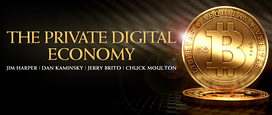Lead Essay
Jim Harper reviews the traits that make a given class of items either useful as money or not. These are the traits that, for example, made gold and silver historically such widespread monetary standards. He finds that bitcoin possesses many of them to a very high degree, but that it very importantly fails on some. Bitcoin’s future is unclear in another respect as well: Established government and financial industry interests will do whatever they can to preserve what they view as their own turf. Still, the greatly increased use of digital currency seems inevitable to him in some form or another, and that form could well be private.
Response Essays
Dan Kaminsky argues that bitcoin’s success so far stems from the success of the Internet itself, and also from the failures of plain old money. Traditional payment methods all face serious challenges in our digitally connected world, and transaction costs to maintain our financial network make plain old money less and less attractive in contrast to its digital counterpart. But bitcoin isn’t perfect either, and the threat of large conglomerates abusing their power isn’t limited to plain old money. It can happen in the bitcoin network too.
Jerry Brito argues that bitcoin is far more than just money. It’s also a distributed-ledger payment system, which means it’s a lot like Visa, MasterCard, or PayPal, but with one key difference: There is no central authority managing the payments. As a result, bitcoin is open to becoming a lot more than “just” money. It can also be used as a token to represent claims on other items. As such, very small fractional bitcoins can function as bonds, stock certificates, property deeds, IOUs, or even decentralized futures markets. The full scope of these possibilities is vast, and we are only beginning to grasp the implications of bitcoin.
Chuck Moulton argues that bitcoin is a sound form of money. Its quantity is known, it expands at a known rate, and it will eventually stop expanding. As a result, fluctuations in the value of bitcoin are almost entirely a function of demand. Moulton suggests fractional reserve banking as a way of stabilizing bitcoin’s value. He goes on to suggest that nations might consider dollarizing to bitcoin as a way of preventing inflation, with the very significant caveat that “a second or third generation cryptocurrency may be the one to finally take hold.”
We are pleased to publish this contribution from Patrick Murck, Bitcoin Foundation General Counsel, who argues digital currency will disrupt traditional finance. This disruption is both very much intentional and likely to empower consumers who have not been able to take advantage of traditional financial services. Older financial system players are likely to resist, of course: They have a stake in the status quo.

